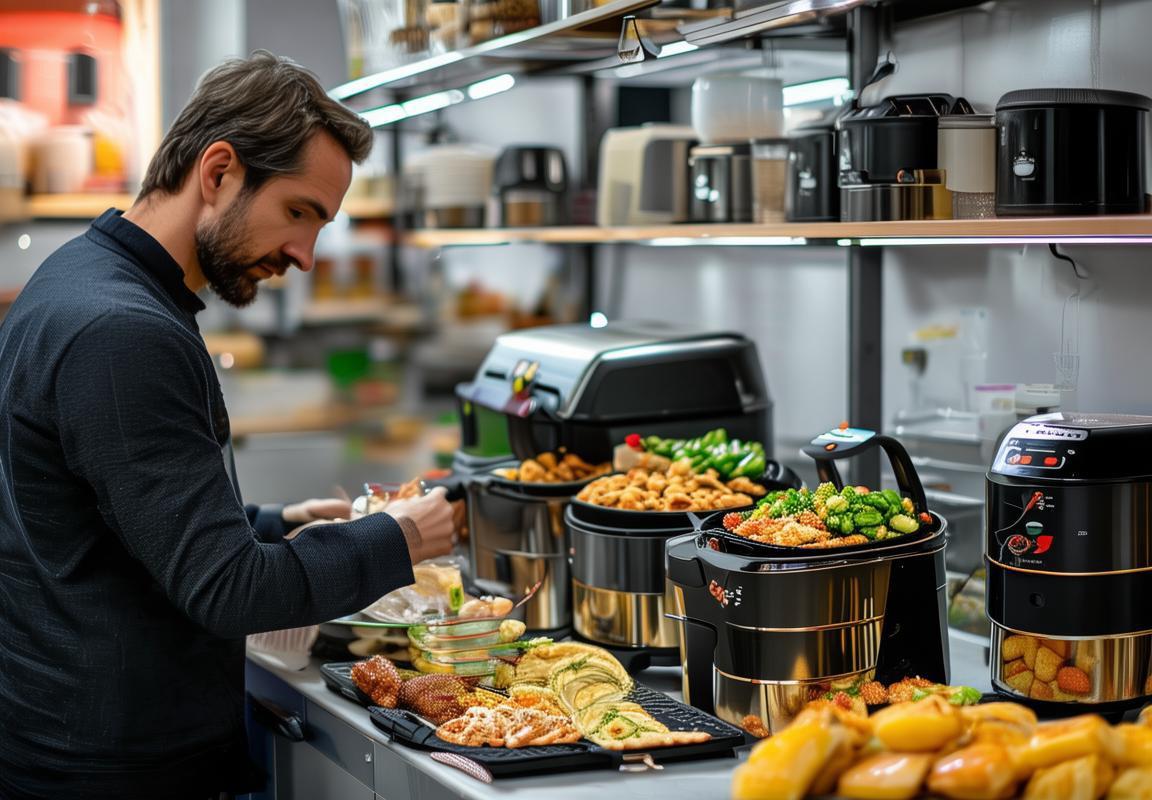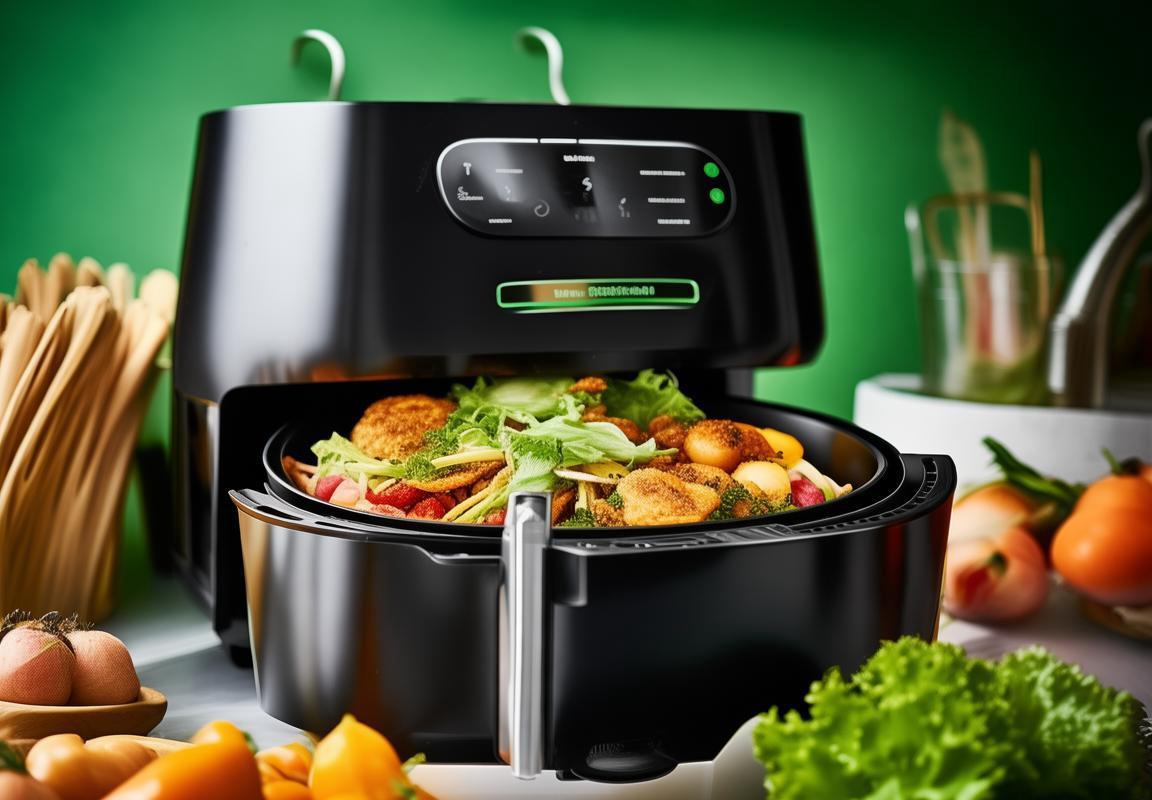Navigating the vast array of air fryer suppliers can be a daunting task, especially when you’re looking for a reliable partner to meet your business needs. With so many options out there, it’s crucial to understand the factors that truly set a supplier apart. From the quality of their products to their customer service, there’s a lot to consider. Let’s delve into some essential tips to help you make an informed decision in the competitive air fryer supplier market.
Understanding the Importance of a Reliable Air Fryer Supplier
When it comes to investing in an air fryer, the quality of the product is paramount. However, the journey to selecting the perfect air fryer can be daunting, especially when it comes to choosing a reliable supplier. A trustworthy supplier is not just about getting your hands on a good appliance; it’s about ensuring a seamless buying experience, consistent product quality, and long-term customer satisfaction. Let’s delve into why a reliable air fryer supplier is essential for your business or personal needs.
Firstly, the reliability of an air fryer supplier directly impacts the quality of the product you receive. A reputable supplier will have stringent quality control measures in place, ensuring that each air fryer meets or exceeds industry standards. This means you’re less likely to encounter defective units or products that don’t perform as advertised. For businesses, this can mean the difference between a satisfied customer base and a string of returns and complaints.
Secondly, a reliable supplier can provide you with the latest technology and innovations in air fryer design. The market for air fryers is continually evolving, with new features and functionalities being introduced regularly. A supplier that stays on top of these trends can offer you the most advanced models, giving you a competitive edge in the market or enhancing your home kitchen experience.
Moreover, a good supplier is your partner in the supply chain. They should be able to provide consistent delivery, ensuring that you never run out of stock. This is particularly crucial for businesses, where a sudden shortage of inventory can lead to lost sales and dissatisfied customers. A supplier with a stable supply chain can help you maintain a smooth operation and keep your customers happy.
Another aspect to consider is the supplier’s customer service. A reliable supplier will be there to assist you with any queries or issues you may have, from product specifications to technical support. This level of support is invaluable, especially when dealing with a complex product like an air fryer. It can save you time and frustration, allowing you to focus on what you do best.
Additionally, a reputable air fryer supplier will offer competitive pricing without compromising on quality. They understand that cost is a significant factor for buyers, and they strive to provide the best value for money. This can be a game-changer for both businesses and consumers, as it allows for more flexibility in budgeting and purchasing decisions.
Furthermore, a supplier’s reputation can speak volumes about their business practices. A company with a strong reputation is more likely to be transparent in their operations, providing you with detailed information about the products, manufacturing processes, and materials used. This transparency is crucial for ensuring that you are making an informed decision and that the product aligns with your values and expectations.
In the realm of sustainability and ethical practices, a reliable air fryer supplier is also likely to prioritize these aspects. They may use eco-friendly materials, adhere to fair labor practices, and have a commitment to reducing their environmental footprint. This not only benefits the planet but can also appeal to customers who are increasingly conscious of their purchasing decisions.
Lastly, consider the long-term relationship you can build with a reliable supplier. A good supplier will be interested in your business’s growth and success, offering you not just products but also insights, advice, and even market research. This collaborative approach can be invaluable, as it allows you to stay ahead of the curve and make strategic decisions for your business.
In conclusion, the importance of a reliable air fryer supplier cannot be overstated. From ensuring product quality and offering the latest innovations to providing exceptional customer service and ethical practices, a good supplier is an essential component of a successful purchase. Whether you’re a business owner looking to stock your shelves or a consumer seeking the perfect kitchen appliance, taking the time to find a reliable supplier is an investment that pays off in the long run.

Key Factors to Consider When Choosing an Air Fryer Supplier
When it comes to selecting an air fryer supplier, it’s crucial to consider several key factors to ensure you’re getting the best product and service. Here are some of the critical aspects to ponder:
-
Product Quality and Range: The quality of the air fryers is paramount. Look for suppliers that offer a variety of models, each with unique features and capabilities. Check if they use high-quality materials and if their products meet international safety standards. A diverse range also means you can cater to different customer needs and preferences.
-
Warranty and After-Sales Service: A reliable supplier should provide a robust warranty and excellent after-sales service. This includes quick response times to any issues, easy returns, and helpful customer support. A good warranty not only protects your investment but also speaks volumes about the supplier’s confidence in their products.
-
Certifications and Compliance: Ensure that the air fryer supplier complies with all relevant industry standards and regulations. Look for certifications like CE, UL, or ETL, which guarantee that the products have been tested and meet safety requirements. This is especially important if you’re exporting or dealing with a global market.
-
Price and Value: While cost is a significant factor, it shouldn’t be the only one. Compare prices across different suppliers, but also consider the value you’re getting. A slightly higher price might be justified if it means better quality, longer durability, and superior customer service.
-
Customization Options: Depending on your business needs, you may require customized air fryers. A good supplier should offer flexibility in design, branding, and features. This can help you differentiate your product in the market and cater to specific customer requirements.
-
Inventory and Lead Times: It’s essential to work with a supplier who can meet your inventory needs and provide timely delivery. Ask about their stock levels and typical lead times. A supplier with a reliable supply chain can ensure that you never run out of stock and that your customers receive their orders promptly.
-
Brand Reputation and Market Presence: Research the supplier’s reputation in the industry. Look for reviews and testimonials from other customers, especially those in your industry. A supplier with a strong market presence and a good reputation is more likely to be trustworthy and reliable.
-
Sustainability and Ethical Practices: In today’s world, sustainability and ethical practices are increasingly important. Choose a supplier that is committed to environmentally friendly manufacturing processes and ethical sourcing. This not only aligns with consumer values but can also be a selling point for your business.
-
Technical Support and Training: A supplier that offers comprehensive technical support and training can be invaluable. This includes assistance with installation, maintenance, and troubleshooting. Good technical support can help you avoid downtime and keep your business running smoothly.
-
Financial Stability: Before committing to a long-term relationship with an air fryer supplier, assess their financial stability. A supplier with a solid financial foundation is less likely to go out of business, leaving you stranded without product or support.
-
Communication and Transparency: Effective communication is key in any business relationship. Ensure that the supplier is responsive to your inquiries and provides clear, transparent information about their products, services, and policies. This includes being upfront about pricing, delivery times, and any potential limitations.
-
Long-Term Partnership Potential: Finally, consider whether the supplier is interested in building a long-term partnership with you. A supplier that values your business and is willing to work with you to achieve mutual success is worth their weight in gold.
By carefully considering these factors, you can choose an air fryer supplier that not only meets your immediate needs but also supports your business goals and values.

Quality Assurance: The Cornerstone of a Good Supplier
Quality assurance is not just a buzzword; it’s the bedrock of a good supplier in the air fryer industry. When you’re looking for a reliable supplier, the quality of their products should be your top priority. Here’s why:
In a market where imitation and substandard products are abundant, a supplier that prioritizes quality assurance stands out. They invest in high-quality materials, cutting-edge technology, and rigorous testing processes to ensure that every air fryer they produce meets the highest standards.
The reliability of an air fryer is paramount for both the supplier and the end-user. A good supplier understands that their reputation hinges on the longevity and performance of their products. They don’t cut corners on components or manufacturing, knowing that a well-built air fryer will not only satisfy customers but also build trust in their brand.
A supplier’s commitment to quality assurance is evident in their certifications and compliance with industry standards. Look for suppliers that hold certifications like ISO 9001, which guarantees a quality management system that meets international standards. These certifications are a testament to their dedication to continuous improvement and customer satisfaction.
Regular inspections and audits are crucial for maintaining high-quality standards. A reputable supplier will conduct internal and third-party audits to ensure that their products are free from defects and meet the required specifications. This vigilance helps in identifying and rectifying any issues before they become significant problems.
The quality of an air fryer is not just about the materials used but also about the design and engineering. A good supplier will have a team of experts who understand the intricacies of air frying technology. They will design products that not only perform well but also offer a user-friendly experience, with intuitive controls and safety features.
Customer feedback is invaluable in the quality assurance process. A supplier who values customer satisfaction will actively seek out and analyze feedback to understand what works and what doesn’t. They use this information to make iterative improvements to their products, ensuring that they stay ahead of the curve in terms of innovation and quality.
The warranty and after-sales service offered by a supplier also speak volumes about their commitment to quality. A comprehensive warranty and responsive customer support are signs that a supplier is confident in the durability and reliability of their air fryers. It also means they are prepared to stand by their product even after the sale.
A good supplier doesn’t just focus on the air fryer itself; they also consider the packaging and shipping process. High-quality packaging ensures that the product arrives in perfect condition, protecting it from damage during transit. This attention to detail reflects a supplier’s overall dedication to quality in every aspect of their business.
Lastly, a supplier’s track record is a clear indicator of their quality assurance practices. Look at their history of product recalls, if any, and how they handled them. A supplier that is transparent about any issues and takes prompt action to rectify them is likely to have a robust quality assurance system.
In summary, when evaluating an air fryer supplier, quality assurance should be at the forefront of your considerations. A supplier that prioritizes quality will not only provide you with a reliable product but also contribute to your business’s success by building trust with your customers and ensuring a long-term partnership.

Checking the Supplier’s Reputation and Customer Reviews
Navigating through the vast array of air fryer suppliers can be daunting, but one critical aspect that stands out is the supplier’s reputation. The reputation of an air fryer supplier is not just a reflection of their public image; it’s a testament to the quality and reliability of their products. Here’s a deeper dive into why checking the supplier’s reputation and customer reviews is crucial.
The first thing to consider is the longevity of the supplier in the market. A supplier that has been around for several years or even decades often has a track record of delivering high-quality products. They’ve likely faced various challenges and adapted to changes, which speaks to their ability to maintain consistency over time.
Customer testimonials are goldmines of information. Look for reviews from customers who have used the air fryer for an extended period. These long-term users can provide insights into how well the appliance holds up over time. Are there common complaints about durability, performance, or parts breaking down prematurely? These details can be telling.
One cannot overstate the importance of brand recognition. A reputable supplier will often have a well-known brand that has been endorsed by industry experts. Check if the supplier’s brand has been featured in reputable publications or has received awards for excellence in their field. This kind of recognition can be a strong indicator of their commitment to quality.
The supplier’s interaction with customers post-purchase is equally important. Look for suppliers who offer robust customer support and after-sales service. A supplier that stands behind their products is more likely to use high-quality components and materials. They understand that a good reputation is built on satisfied customers who recommend their products to others.
Online forums and social media platforms are treasure troves for customer reviews. People often share their experiences in these spaces, whether they’re raving about a great product or venting about a poor one. Pay attention to the tone and frequency of these reviews. Are there more positive than negative comments? Are the negative comments constructive or indicative of a systemic issue?
Another way to gauge reputation is through certifications and standards compliance. A supplier that adheres to international safety and quality standards is more likely to produce reliable air fryers. Look for certifications like CE, FDA, or NSF, which signify that the product meets certain health and safety criteria.
It’s also wise to consider the supplier’s relationship with their distributors and retailers. A supplier that has a strong network is more likely to have a consistent supply chain and to ensure that their products are well-stocked and available to customers. This can be a good sign that they prioritize customer satisfaction.
When it comes to customer reviews, look for patterns rather than just isolated incidents. For example, if multiple reviews mention that the air fryer arrived damaged, it might be a sign of a packaging issue or a problem with the shipping process. Conversely, if many reviews praise the air fryer’s even heating and easy-to-clean features, it’s a positive sign of product quality.
In addition to reading reviews, consider reaching out to the supplier directly. Ask about their return and warranty policies. A supplier that is confident in their product will have clear and fair policies in place. This not only protects the consumer but also reflects positively on the supplier’s reputation.
Lastly, keep in mind that the internet is filled with both genuine and fake reviews. It’s important to discern between the two. Look for reviews that provide specific details about the product’s performance and the reviewer’s experience. If a review seems too good to be true, it might be. Trust your judgment and look for consensus among a variety of reviews.
By meticulously checking a supplier’s reputation and customer reviews, you can gain a comprehensive understanding of the quality and reliability of their air fryers. This due diligence can save you from potential headaches and ensure that you’re investing in a product that will serve you well for years to come. Remember, a good reputation is a reflection of the supplier’s dedication to quality, customer satisfaction, and long-term success in the market.

Comparing Pricing and Value for Money
When it comes to selecting an air fryer supplier, the pricing and value for money are two critical aspects that shouldn’t be overlooked. Here’s a breakdown of what to consider:
Understanding the Cost StructureThe first thing to consider is the overall cost structure of the air fryer supplier. This includes not just the unit price of the fryers, but also any additional fees or hidden costs. Be sure to ask about shipping, taxes, and any potential ongoing service fees. A transparent cost structure is a sign of a reliable supplier.
Analyzing Unit PricingCompare the unit pricing of air fryers from different suppliers. It’s not always about finding the cheapest option; sometimes, the lowest price may reflect lower quality or poor build. Look for a balance between affordability and quality. High-quality air fryers might have a slightly higher unit price, but they can offer better durability and performance in the long run.
Considering the Market ValueMarket value is another important factor. It’s about understanding how the price of the air fryer aligns with its market standing. A supplier that offers a premium product at a standard price may be a good fit, as it suggests a fair balance between cost and value. Conversely, if a supplier is charging significantly more for what is considered a standard product, you might want to investigate further.
Long-Term CostsIt’s not just about the initial purchase price; you also need to consider the long-term costs. This includes factors like maintenance, repair, and energy consumption. An air fryer that is cheaper to buy but more expensive to maintain or runs up high energy bills can negate any initial savings. Look for suppliers that offer comprehensive support and energy-efficient models.
Volume Discounts and Bulk PurchasesIf you’re looking to buy in bulk, consider how volume discounts might affect the value for money. Some suppliers offer better rates for larger orders, which can significantly reduce the cost per unit. However, ensure that the quality isn’t compromised as the volume increases.
Comparing Warranty and SupportThe inclusion of a warranty and the level of after-sales support can also contribute to the overall value for money. A supplier that offers a longer warranty period and responsive customer service may justify a slightly higher price due to the peace of mind and security it provides.
Looking for Hidden CostsHidden costs can include anything from customs duties and import taxes to installation and training fees. Be thorough in your inquiries to avoid surprises. A reputable supplier will be upfront about all potential additional expenses.
Understanding the Supplier’s Pricing StrategySuppliers might use different pricing strategies based on market conditions, brand positioning, or production costs. Understanding their strategy can help you gauge if you’re getting a fair deal. For example, a supplier with a premium brand may charge more, but they might also offer a higher-quality product with better features.
Value-Added ServicesSome suppliers might offer value-added services such as training programs, marketing support, or extended warranty options. These can add significant value to the purchase, even if the unit price is higher. Consider these services when evaluating the total cost of ownership.
Customer Testimonials and Case StudiesReading customer testimonials and case studies can provide insights into how well the supplier’s products and services meet customer expectations. Often, these stories highlight where the value truly lies and can guide you in making an informed decision about pricing.
In conclusion, comparing pricing and value for money when choosing an air fryer supplier is a multifaceted process. It involves a thorough analysis of costs, market value, long-term considerations, and the inclusion of value-added services. By taking the time to understand these elements, you can make a more informed decision that aligns with your budget and business needs.

Assessing the Supplier’s Product Range and Customization Options
When it comes to selecting an air fryer supplier, the breadth and depth of their product range can be a significant deciding factor. Here’s a closer look at what to consider when assessing a supplier’s offerings and their willingness to cater to your specific needs.
Understanding the RangeThe first thing to consider is the variety of air fryers available from the supplier. Are they offering a range that caters to different sizes, capacities, and power levels? A good supplier should have options for both small kitchens and large commercial settings. They should provide a mix of entry-level models for those just starting out and advanced features for seasoned chefs.
Specialty ModelsLook for suppliers that offer specialty models. These might include air fryers with unique features like programmable settings, non-stick surfaces, or even air fryers that are designed for specific types of cooking, such as crispy French fries or juicy chicken wings. A diverse range allows you to choose the perfect appliance for your specific culinary requirements.
Customization OptionsA supplier worth their salt should offer customization options. This could mean a range of colors and finishes to match your kitchen’s aesthetic, or even more substantial modifications like adding your brand’s logo or changing the control panel layout. Customization isn’t just about appearance; it can also involve tweaking the appliance’s performance to meet specific cooking needs or preferences.
Quality ComponentsThe quality of the components used in the air fryers is crucial. A supplier should be transparent about the materials they use, ensuring that they are durable and safe for food contact. High-quality components not only mean a longer-lasting product but also a more consistent and reliable performance.
Certifications and StandardsA reputable supplier will have their products certified to meet international safety and quality standards. Look for certifications like CE, FDA, or NSF, which indicate that the air fryers have been tested and comply with stringent guidelines. These certifications are your assurance that the supplier is committed to delivering a high-quality product.
Innovation and TechnologyA supplier that invests in innovation and technology will likely offer air fryers with cutting-edge features. This could include smart technology that allows for remote control and monitoring, energy-saving modes, or even self-cleaning capabilities. These advancements not only enhance the user experience but also reflect the supplier’s dedication to staying ahead in the market.
SustainabilityIn today’s market, sustainability is a key consideration. A supplier that offers air fryers made with sustainable materials or that has a commitment to reducing its environmental footprint can be a strong choice. This might include using recycled materials, ensuring that the manufacturing process is energy-efficient, or offering a take-back program for old appliances.
Support and After-Sales ServiceThe range of products is just one part of the equation. A supplier should also offer comprehensive support and after-sales service. This includes detailed product information, user manuals, and customer service hotlines. It’s also worth checking if they offer warranty options or replacement parts, which can be crucial for maintaining your air fryers over time.
Market Presence and ExperienceConsider the supplier’s market presence and experience. A supplier that has been in the industry for a while is likely to have a better understanding of customer needs and market trends. They should also have a strong network of distributors and retailers, ensuring that you can find their products easily.
Customer FeedbackLastly, don’t underestimate the power of customer feedback. Look for reviews from other businesses or consumers who have purchased the supplier’s air fryers. This can give you insights into the real-world performance and reliability of their products.
By carefully assessing the supplier’s product range and customization options, you can ensure that you’re not just getting an air fryer, but a solution that aligns with your needs, preferences, and business goals.

Sustainability and Ethical Practices: A Modern Supplier’s Responsibility
Navigating the market for an air fryer supplier can be a daunting task, especially when considering the environmental and ethical implications of the products you choose. A modern supplier must not only offer quality products but also demonstrate a commitment to sustainability and ethical practices. Here are some key aspects to consider in this regard:
Understanding the supplier’s sustainability initiatives is crucial. Look for suppliers that have a clear strategy for reducing their carbon footprint. This might include using renewable energy sources, minimizing packaging waste, or investing in energy-efficient manufacturing processes. It’s a sign of a supplier that is serious about its impact on the planet.
Eco-friendly materials are another important indicator. A responsible supplier will use sustainable materials in the production of their air fryers. This could mean opting for recycled plastics, biodegradable components, or materials that have a lower environmental impact throughout their lifecycle. By choosing such suppliers, you contribute to a more sustainable future.
Ethical labor practices are fundamental to any business’s reputation. Ensure that the supplier you choose adheres to fair labor standards, providing safe working conditions, fair wages, and a respectful work environment. Transparency in this area can be confirmed through certifications like Fair Trade or BSCI (Business Social Compliance Initiative).
Product life cycle analysis (PCA) can reveal a lot about a supplier’s commitment to sustainability. A supplier that conducts PCA is more likely to design products that are durable, repairable, and recyclable. This approach reduces waste and extends the lifespan of the product, aligning with the principles of circular economy.
The recycling process is also a critical component. A supplier should have a clear policy on recycling and proper disposal of their products at the end of their useful life. This includes providing instructions for recycling and partnering with recycling programs that ensure materials are responsibly handled.
Supply chain transparency is essential. A supplier that can trace its materials back to their origin is more likely to be ethically responsible. This transparency helps prevent the use of conflict minerals or materials sourced from areas with human rights abuses.
The supplier’s approach to waste reduction is indicative of its commitment to sustainability. Look for suppliers that have policies in place to minimize waste, such as reducing packaging materials or implementing in-house recycling programs.
Energy efficiency in the manufacturing process is another hallmark of a sustainable supplier. Efficient energy use not only reduces costs but also has a direct impact on the environment. A supplier that invests in energy-saving technologies is making a conscious effort to be eco-friendly.
Certifications are a powerful tool for assessing a supplier’s sustainability. Look for third-party certifications like the Energy Star label for energy efficiency, or environmental certifications like FSC (Forest Stewardship Council) for responsible sourcing of wood products.
A supplier’s involvement in community development and social responsibility initiatives speaks volumes about its ethical standing. These initiatives could include supporting local communities, contributing to educational programs, or donating to environmental causes.
Lastly, consider the supplier’s willingness to adapt and innovate. A forward-thinking supplier is more likely to embrace new technologies and practices that promote sustainability. This could involve developing new materials, exploring alternative energy sources, or finding ways to reduce waste in production.
In conclusion, when evaluating an air fryer supplier, it’s important to consider a wide range of sustainability and ethical practices. From the materials used to the labor practices and the overall impact on the environment, these factors can help you make an informed decision that aligns with your values and contributes to a more sustainable world.

Supply Chain Stability and Lead Times
Navigating the complexities of supply chain stability and lead times is a critical aspect when selecting an air fryer supplier. This not only affects your operational efficiency but also your ability to meet customer demands. Here’s a deeper look into what you should consider:
Understanding the supplier’s supply chain can reveal a lot about their reliability. A robust supply chain is characterized by a network of trusted partners, efficient logistics, and a clear understanding of market trends. It’s important to inquire about the supplier’s logistics capabilities, including their transportation methods and warehouse management systems. Do they use eco-friendly practices? How do they ensure timely delivery without compromising quality?
Lead times, or the time it takes from placing an order to receiving the product, can vary greatly. Shorter lead times are ideal for businesses that require quick turnaround or face high demand fluctuations. Ask your supplier about their standard lead times and whether they offer expedited shipping options. It’s also worth noting if they have inventory on hand or if orders are made to order, which can significantly impact lead times.
Consistency in supply is another key factor. A supplier with a stable supply chain can ensure a steady flow of products, reducing the risk of stockouts. Discuss with your supplier how they manage inventory and how they handle situations where demand outpaces supply. Do they have contingency plans in place for such scenarios?
Quality control throughout the supply chain is non-negotiable. An air fryer supplier should have stringent quality checks at various stages of production and distribution. This includes raw material inspections, in-process quality audits, and final product testing. A supplier that takes pride in their quality control processes is more likely to deliver products that meet your standards.
The geographical location of the supplier can also impact lead times and supply chain stability. Suppliers closer to your market may offer shorter lead times due to reduced transportation distances. However, this doesn’t always mean they are the best choice. Consider the balance between proximity and the supplier’s reputation for reliability.
Communication is key when it comes to supply chain stability. A good supplier should provide regular updates on the status of your order, including any potential delays or changes in lead times. This proactive communication helps in planning and managing your business operations effectively.
In today’s world, sustainability is a significant concern. An air fryer supplier with a commitment to sustainability may have a more stable supply chain. They might source materials from sustainable sources, use energy-efficient processes, and minimize waste. These practices can lead to more predictable supply and lower environmental impact.
Lastly, consider the supplier’s flexibility. A supplier that can adapt to changes in your business needs or market conditions is more likely to maintain a stable supply chain. This could mean the ability to scale production quickly, offer various packaging options, or provide custom solutions.
In conclusion, when assessing supply chain stability and lead times, look for a supplier with a clear understanding of their logistics, a history of on-time deliveries, robust quality control measures, and a commitment to sustainability. Their ability to communicate effectively and adapt to changes will also play a crucial role in ensuring a stable and reliable supply of air fryers to your business.

Customer Service and Support: A Key Differentiator
Understanding the importance of exceptional customer service and support in the realm of supplier relationships is crucial. In a competitive market, the way a supplier handles inquiries, resolves issues, and maintains a strong line of communication can be the difference between a seamless business partnership and a source of constant frustration. Here are several aspects to consider when evaluating a supplier’s customer service and support:
The responsiveness of a supplier’s customer service team is often a reflection of their commitment to customer satisfaction. Quick responses can mean the difference between a minor inconvenience being resolved promptly and a small issue escalating into a major problem. Whether it’s through email, phone, or live chat, a supplier that prioritizes timely communication is one that values its clients’ time and business.
In today’s digital age, the availability of a comprehensive FAQ section or knowledge base can be a game-changer. A well-organized and easily navigable resource allows customers to find answers to common questions without the need for direct contact. This self-service option not only saves time but also demonstrates the supplier’s proactive approach to customer support.
The quality of the customer service team is not just about speed; it’s also about the expertise and empathy they bring to the table. A supplier with well-trained staff can address complex issues with ease and provide solutions that are tailored to the specific needs of the customer. This level of service shows that the supplier is invested in the success of its clients and is willing to go the extra mile to ensure satisfaction.
A good supplier understands that customer service is not just about solving problems but also about anticipating them. They may offer regular check-ins or proactive alerts to inform customers of potential issues or upcoming maintenance that could affect product performance. This foresight can prevent downtime and keep the business running smoothly.
In the event of a product failure or recall, the supplier’s handling of the situation is critical. A supplier that takes responsibility, provides clear instructions on how to rectify the issue, and offers a straightforward replacement or repair process demonstrates a high level of customer care. This kind of support can help maintain the trust and loyalty of the customer.
The ability to offer after-sales support is another indicator of a supplier’s commitment to customer service. This can include follow-up calls, maintenance tips, or even the option to upgrade products over time. A supplier that continues to support its customers post-purchase is likely to be a reliable partner for the long term.
Transparency in communication is key. A supplier should provide clear and honest information about product specifications, delivery times, and any potential limitations. This openness builds trust and allows customers to make informed decisions.
In the case of a dispute or misunderstanding, the supplier’s willingness to listen and find a mutually agreeable solution is vital. A supplier that values its reputation and customer relationships will work diligently to resolve any conflicts, ensuring that both parties walk away satisfied.
Lastly, the supplier’s commitment to continuous improvement is evident in how they handle feedback. A supplier that actively seeks and responds to customer suggestions is one that is dedicated to enhancing its service and products over time.
In summary, customer service and support are not just about the immediate interaction but about the overall experience and relationship with the supplier. A supplier that excels in these areas can be a valuable asset to any business, contributing to its success and growth through exceptional service and unwavering support.

Final Tips for Navigating the Air Fryer Supplier Market
Navigating the air fryer supplier market can be a daunting task, especially when you’re looking for a partner that not only meets your needs but also stands out in terms of quality and service. Here are some final tips to help you make the best choice:
-
Do Your Research ThoroughlyTake the time to delve into the market. Look for suppliers that have been in the industry for a while, as experience often translates to reliability and a better understanding of customer needs.
-
Visit Trade Shows and ExposThese events are fantastic opportunities to meet suppliers face-to-face. You can see their products up close, get a sense of their branding, and gather insights into their business practices.
-
Understand the Product LifecycleA good supplier will be able to guide you through the product lifecycle, from design and development to production and distribution. This ensures that you’re getting the most out of your partnership.
-
Evaluate the Supplier’s FlexibilityThe market is always evolving, and your supplier should be able to adapt. Whether it’s scaling up production to meet increased demand or modifying products to fit new market trends, flexibility is crucial.
-
Don’t Ignore the Importance of CertificationsLook for suppliers that hold relevant certifications, such as ISO standards for quality management or environmental sustainability. These certifications can give you peace of mind about the supplier’s practices.
-
Consider the Total Cost of OwnershipWhile the initial price tag might be tempting, consider the long-term costs. This includes not only the purchase price but also shipping, maintenance, and any potential repairs or replacements.
-
Look for a Supplier with a Strong NetworkA supplier with a robust network can often offer better pricing, faster delivery, and a wider range of products. This is particularly important if you’re looking to expand your product line or enter new markets.
-
Check for Innovation and Continuous ImprovementThe air fryer market is competitive, and innovation is key to staying ahead. A supplier that invests in research and development is likely to offer you the latest and greatest products.
-
Don’t Overlook the Role of TechnologyIn today’s world, technology plays a significant role in the supply chain. Suppliers who use advanced systems for inventory management, order tracking, and customer communication can offer a more seamless experience.
-
Seek Feedback from Current ClientsIf a supplier is worth their salt, they should be happy to provide references or case studies from their existing clients. Don’t hesitate to reach out to these clients for their insights and experiences.
-
Understand the Terms of Payment and DeliveryBefore committing to a supplier, make sure you fully understand the terms of payment and delivery. This includes any minimum order quantities, lead times, and the supplier’s policies on returns and exchanges.
-
Establish Clear Communication ChannelsOpen and transparent communication is essential for a successful partnership. Ensure that the supplier has clear channels for communication, including regular updates on orders and any potential issues.
-
Plan for ContingenciesNo matter how reliable a supplier may seem, it’s important to have a contingency plan. This could include backup suppliers or alternative products in case of delays or disruptions.
-
Build a Long-Term RelationshipLook for suppliers who are willing to build a long-term relationship with you. This often means they are committed to your success and are more likely to go the extra mile to meet your needs.
-
Trust Your InstinctsAt the end of the day, trust your instincts. If something feels off about a supplier, it’s worth exploring those concerns further. A good supplier will be understanding and willing to address any reservations you might have.
Remember, choosing the right air fryer supplier is about finding a partner who aligns with your business goals, values, and expectations. Take your time, do your homework, and don’t rush into a decision that could impact your business for years to come.